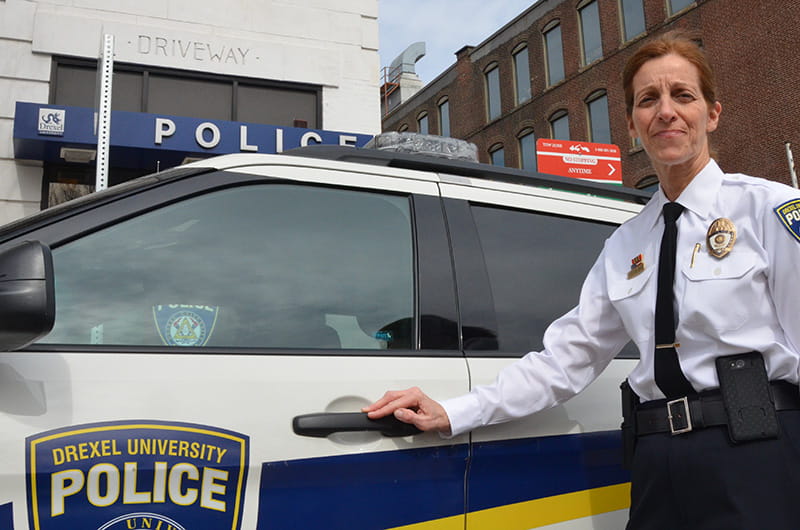Drexel's New Police Chief Remembers Her Pioneering Career and Tells Her Best Cop Story
 By Matt Erickson
By Matt Erickson

In more than 37 years in law enforcement, Eileen Behr has just about done it all.
She started out as a police dispatcher, worked with juveniles, served as a detective and became a negotiator for the tactical team. She was a police chief and a sheriff. But her latest job is a new one: leading a university campus police force.
Behr, who became Drexel’s director of police operations in January, has also been a pioneer. She became the first female police chief in Montgomery County in 2003 when she was appointed to lead the force in Whitemarsh Township, where she was born and raised. In 2010, she became the county’s first female sheriff.
DrexelNow sat down with Behr to discuss what it was like to work at a time when women were first entering police departments, how her new job at Drexel is helping her come full circle and why the world can seem pretty small for a police officer.
Why did you decide to go into law enforcement in the first place?
Up until my junior year of high school, I was actually going to major in art. But then I decided I wanted to go into a career where I would work with juveniles. At that time, females in Pennsylvania couldn’t be police officers. But you could work in juvenile court. So that’s where I decided I might like to go.
I went to Montgomery County Community College in 1974 to study criminal justice. At about that time, there were several lawsuits filed in Pennsylvania, and the state had to start accepting women into the police academy. So by the time I finished school, women were getting accepted into police departments. And to work with juveniles, now you had to start work as a police officer.
So you came into the field right when women were first being accepted. How did that affect your career?
It was interesting. I was one of the first six females in Montgomery County to go into the police academy and go out on patrol. There was some resentment, but there was a lot of acceptance from officers my age. It was kind of almost like a novelty.
You knew you were under a lot of pressure. You were definitely under a microscope, so anything you did, whether good or bad, kind of became a news story. So you really had to concentrate on keeping your head down and doing your job. So that’s what I did. And I really liked my job.
I ended up becoming the first female police chief in Montgomery County, and the first female sheriff. I don’t always put that much emphasis on “first,” though — I was just going through the ranks. But I was a survivor. A lot of the women who started with me retired early or started other careers. A lot of them started families, and it was a tough career for doing that. So I was probably the last survivor of those first six. I was very fortunate: I have a supportive family.
Why did you decide to come to Drexel?
It’s going back to my original goal of working with young people. This is an opportunity I didn’t see coming my way. Being sheriff is definitely more administrative, and this is more hands-on police work. Being around young people and getting back into neighborhoods and the community — that was a real appeal for me. I guess I kind of came full circle.
After a few months on the job, what’s a campus safety tip you might have for faculty and professional staff?
Do not leave your personal property unattended. Don’t leave it out in the open. If you’re going to work out in the gym, just take what you need. If you take your wallet, leave your money at home.
This isn’t just on a campus; this is everywhere. Most crimes are crimes of opportunity: Somebody sees something unattended, and they pick it up and walk away.
You’ve probably seen some interesting things during your career in law enforcement. What’s a good story you can share?
One time, I delivered a baby, which is a very scary thing. It’s just the mom, the officer and the baby. You just say your prayers. But I delivered a healthy little girl, with the mother on her living-room sofa. At the time I delivered the baby, I was also pregnant. I didn’t know the family.
Now, fast-forward about five years. I have a daughter who’s 5 years old, and she’s going to camp. She becomes best friends with another little girl. My daughter brings her new best friend home after camp one day — and it’s the little girl who I delivered. They had never seen each other before they went to camp.
After that, she would proudly say, “Jessica’s mom delivered me.” I even coached her in a civic basketball league. I still see her now, and she’s a beautiful young lady.
Life connects us in eight different degrees, especially in a small community. And Drexel’s a small community in some ways. I guess that was one of the things that drew me here.